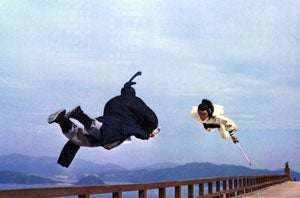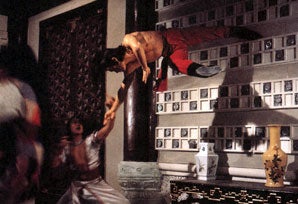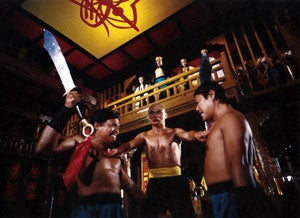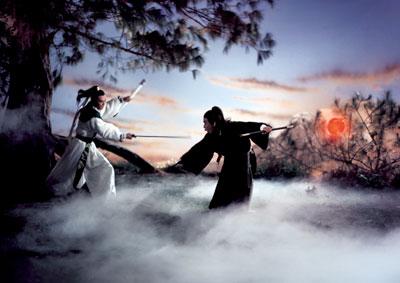In keeping with martial arts movie tradition, the UCLA Film & Television Archive returns with a sequel to the successful Heroic Grace series launched in 2003. Heroic Grace: The Chinese Martial Arts Film, Part II picks up where the first one left off. While the debut series traced the development of this most influential of Chinese film genres, from its origins in Shanghai in the 1920s through the halcyon days of Hong Kong-based production in the 1970s and '80s, this series digs deeper into that enormously creative period when kung fu entered our popular lexicon, and teases out linkages to the '90s generation of Hong Kong action and the more recent pan-Chinese wuxia pian (swordplay film) revival.
Heroic Grace II accords a closer look at the overlooked auteurs of the martial arts cinema. To the roster of masters Zhang Che (Chang Cheh) and King Hu (Hu Jinquan), we can now add Chu Yuan (Chor Yuen) and Lau Kar-leung (Liu Jialiang), and possibly Chung Chang-wha. At various points in their careers, these directors worked for major Hong Kong studios Shaw Brothers, Cathay and Golden Harvest. At other times, they branched out on their own, shooting movies in Taiwan or for smaller independent companies in Hong Kong, or in the case of Chung, worked in South Korea.
Martial arts cinema was nothing if not star-driven in its postwar, "new school" and beyond incarnations, and the stars who emerged in the '70s and '80s were the brightest of them all: Bruce Lee (Li Xiaolong), Chen Guantai, Luo Lie, David Jiang (Jiang Dawei), Di Long, and Gordon Liu (Liu Jiahui). Heroic Grace II will screen a selection of their career highlights, as restorations or archival prints, many unavailable for public exhibition until now.
And finally the Archive celebrates the women who blazed paths of glory across the jiang hu (literally "rivers and lakes"; metaphorically the mythic realm of the martial arts), whose talents younger film fans may have glimpsed only in fragmentary form, oftentimes on butchered video. Heroic Grace II will present rediscoveries of some of the best, rarely screened works featuring such martial arts queens as Kara Hui (Wei Yinghong), Betty Bei Di and Nora Miao (Miao Kexiu).
The Heroic Grace II tour will run throughout 2006 at venues in the United States and Canada, and will continue at select venues in Europe during the first six months of 2007.
The program consists of the following 10 classic Shaw Brothers titles:
THE NEW ONE-ARMED SWORDSMAN (Xin Dubi Daowang) (1971, Hong Kong)
Directed by Zhang Che

Zhang Che revisits the premise of his epochal ONE-ARMED SWORDSMAN (1967) but with a gruesome difference. David Jiang portrays an arrogant warrior humbled by a nefarious opponent and forced to hack off his own arm. Years of waiting tables fortify his single-handed dexterity, but what finally launches him back on the path of bloody retribution is the untimely death of his comrade Di Long. The actors were Zhang's preferred pairing of heroes in his '70s films, and like other of the director's films about male bonding, THE NEW ONE-ARMED SWORDSMAN is charged through with latent homoeroticism. Fuelled by the estimable action choreography of longtime collaborators Tong Kai and Lau Kar-leung, the film builds to an astonishing finale traversing the entire span of a bridge and then some.
Shaw Brothers. Producer: Runme Shaw. Screenplay: Ni Kuang. Cinematographer: Gong Muduo. Editor: Guo Tinghong. Martial Arts Director: Tong Kai, Lau Kar-leung. Cast: David Jiang, Di Long, Li Jing, Gu Feng. Presented in Mandarin dialogue with Chinese and English subtitles. 35mm, 94 min.
Newly restored by Celestial Pictures
THE BOXER FROM SHANTUNG (Ma Yongzhen) (1972, Hong Kong)
Directed by Zhang Che and Bao Xueli
This brutal fight film adapts the proverbial rise-and-fall gangster formula to the mean streets of '30s Shanghai. Chen Guantai is a poor hick from Shandong ("Shantung" according to the old Wade-Giles romanization) whose fearsome boxing ability allows him to muscle his way to the top of the Shanghai underworld. Bursting with typically Zhangian bloodshed and distinguished by Chen's authentic kung fu technique (the film proved to be the actor's breakout vehicle), BOXER also features Shaw luminaries David Jiang as a charismatic gangland don and Jing Li as a principled songstress. Among its highlights that have inspired a host of imitators: an iconic match between Chen and a Russian wrestler, and ruthless hatchet-wielding thugs, most recently revived as the "axe gang" in Stephen Chow's comic tribute to the martial arts cinema, KUNG FU HUSTLE.
Shaw Brothers. Producer: Runme Shaw. Screenwriter: Ni Kuang, Zhang Che. Cinematographer: Gong Muduo, Ruan Dingbang. Editor: Guo Tinghong. Martial Arts Director: Tong Kai, Lau Kar-leung, Lau Kar-wing, Chen Quan. Cast: Chen Guantai, Jing Li, David Jiang, Ma Lannu. Presented in Mandarin dialogue with English subtitles. 35mm, 126 min.
Newly restored by Celestial Pictures
KING BOXER (Tianxia Diyi Quan) (1972, Hong Kong)
Directed by Chung Chang-wha
Korean director Chung Chang-wha was among the foreign talent hired by studio mogul Run Run Shaw in the late '60s to help meet Asian audiences' growing taste for tough action films. KING BOXER's gritty revenge tale met that challenge and more; it became the first kung fu film to be a hit in the West and paved the way for the Bruce Lee phenomenon to come. Actor Luo Lie brings characteristic intensity to his role as an "Iron Fist" adept whose fingers are viciously shattered by a rival gang. (The film was released internationally under the title FIVE FINGERS OF DEATH). In paradigmatic fashion, he then trains his way back to peak form and wreaks vengeance on his adversaries. Joining ferocious hand-to-hand combat with a nationalistic subtext (as did the contemporaneous Bruce Lee titles), the film unabashedly ascribes villainy (and inferior fighting methods) to the Japanese.
Shaw Brothers. Producer: Run Run Shaw. Screenwriter: Jiang Yang. Cinematographer: Wang Yonglong. Editor: Jiang Xinglong, Fan Gongrong. Martial Arts Director: Lau Kar-wing, Chen Quan. Cast: Luo Lie, Wang Ping, Wang Jinfeng. Presented in Mandarin dialogue with English subtitles. 35mm, 97 min.
THE MAGIC BLADE (Tianya Mingyue Dao) (1976, Hong Kong)
Directed by Chu Yuan

Chu Yuan followed the popular success of KILLER CLANS (screened in the first Heroic Grace) with this outré martial arts fantasy, possibly the most celebrated of his 21 adaptations of Taiwanese writer Gu Long's novels. Shaw action stars Di Long and Luo Lie are chivalric rivals who join forces to track down a legendary weapon—the terrifying Peacock Dart!—and defeat an evil sorcerer bent on domination of the jiang hu. Along the way a wild menagerie of armed henchmen, conniving nobles and beauties, and a militant grandma crosses swords with poncho-clad Di Long, sans cheroot but brandishing his own custom spinning blade. With thrilling acrobatics arrayed against a diorama of ancient Chinoiserie, THE MAGIC BLADE confirmed Chu Yuan as a master of the '70s wuxia spectacular.
Shaw Brothers. Based on a novel by Gu Long. Producer: Runme Shaw. Screenwriter: Ni Kuang, Situ An. Cinematographer: Huang Jie. Editor: Jiang Xinglong. Martial Arts Director: Tong Kai, Huang Peiji. Cast: Di Long, Luo Lie, Jing Li, Tian Ni. Presented in Mandarin dialogue with Chinese and English subtitles. 35mm, 96 min.
THE JADE TIGER (Bai Yu Laohu) (1977, Hong Kong)
Directed by Chu Yuan
Chu Yuan's penchant for labyrinthine plotting reaches its zenith in this dizzying adaptation of the Gu Long source novel. Di Long heads an all-star cast as a Zhou warrior catapulted by the threat of his father's decapitation, delivered on his wedding day, into the middle of a no-holds-barred war between his clan and the Tangs. The outrageous characters, exotic weapons and proliferating layers of subterfuge are hyperbolic even by the standards of an already excess-saturated subgenre. Chu's characteristic visual splendor contributes to the air of delirium, but a self-conscious pathos about the futility of martial rivalry lends the film thematic ballast and anticipates the reflexive tone adopted in the melancholy wuxia by the Hong Kong New Wave of the '80s.
Shaw Brothers. Producer: Mona Fong. Screenwriter: Gu Long, Chu Yuan. Cinematographer: Huang Jie. Editor: Jiang Xinglong. Martial Arts Director: Tong Kai, Huang Peiji. Cast: Di Long, Gu Feng, Li Lili, Luo Lie. Presented in Mandarin dialogue with Chinese and English subtitles. 35mm, 101 min.
CLANS OF INTRIGUE (Chu Liuxiang) (1977, Hong Kong)
Directed by Chu Yuan
Chu Yuan continued his cinematic transmutation of the Gu Long literary oeuvre with this gripping wuxia "whodunnit" set in the timeless realm of martial chivalry. Famed swordsman Chu Liuxiang (Di Long) is framed for the murder of three clan chiefs. Leaving behind leisure and connoisseurship—a resplendent houseboat and poetry-spouting friends—Chu embarks on an investigation that leads him from a mystery woman to Buddhist monks and a grotto-dwelling clan of female fighters led by a lesbian (Betty Bei Di). Gradually he uncovers a convoluted conspiracy that culminates in an unforgettable gender-bending twist. Fantastical and fringed with risqué sexual flourishes, CLANS OF INTRIGUE is echt Chu, a baroque martial arts saga replete with artifice and larger-than-life archetypes engaged in elegantly choreographed mortal combat.
Shaw Brothers. Based on a novel by Gu Long. Producer: Runme Shaw. Screenwriter: Ni Kuang. Cinematographer: Huang Jie. Editor: Jiang Xinglong. Martial Arts Director: Tong Kai, Huang Peiji. Cast: Di Long, Betty Bei Di, Nora Miao, Yue Hua. Presented in Mandarin dialogue with Chinese and English subtitles. 35mm, 99 min.
Newly restored by Celestial Pictures
THE FIVE VENOMS (Wu Du) (1978, Hong Kong)
Directed by Zhang Che

Long a favorite of martial arts movie fans, THE FIVE VENOMS was the defining showcase for late-career, all-male-ensemble Zhang Che. The dying master of the Venoms House tasks his one remaining disciple to bring to justice the young man's five predecessors, now dispersed and fallen into ignominious criminality. The elder Venoms quintet, however, possesses formidable skills, each in a distinctive fighting style: scorpion, snake, centipede, gecko and toad. The youngest Venom locates them in a small town, and in this nexus of gold loot, shady cops and corrupt judges, a suspenseful mystery plot unfolds, punctuated by some of the most lucidly articulated and imaginative fight sequences of the martial arts cinema. Uncharacteristically—and unlike even the previous Heroic Grace selection, BLOOD BROTHERS—Zhangian brotherhood is rent asunder by greed and betrayal among men.
Shaw Brothers. Producer: Runme Shaw. Screenwriter: Ni Kuang, Zhang Che. Cinematographer: Gong Muduo, Cao Huiqi. Editor: Jiang Xinglong. Martial Arts Director: Liang Ting, Lu Feng, Dai Qixian. Cast: Jiang Sheng, Sun Jian, Guo Zhui, Lu Feng, Wei Bai, Luo Mang. Presented in Mandarin dialogue with English subtitles. 35mm, 97 min.
DIRTY HO (Lan Tou Hou) (1979, Hong Kong)
Directed by Lau Kar-leung
Fighting without seeming to fight—that's the ingenious premise at the heart of this dazzler by martial arts grandmaster Lau Kar-leung. The director's mainstay Gordon Liu plays a prodigal prince (and hyper-cultivated epicurean) targeted for assassination by his elder brother. Enter Wang Yu (not to be mistaken for the star of ONE-ARMED SWORDSMAN) as the eponymous Ho, a boisterous ruffian who reluctantly apprentices himself to the expert Liu. With the killers disguised as a wine merchant and an antiques dealer, the prince finds himself parrying dangerous kicks and blows while in art appreciation mode. The climactic fight-back-to-the-palace pitting prince and apprentice against a battery of swords and arrows is a set piece for the ages. Like the title it belies, this movie about the art of the martial arts brilliantly distills its director's penchant for discoursing on the beauty and rigor of a genre that's clearly more than chopsocky.
Shaw Brothers. Producer: Run Run Shaw. Screenwriter: Ni Kuang. Cinematographer: Huang Yuetai, Ao Zhijun. Editor: Jiang Xinglong, Li Yanhai. Martial Arts Director: Lau Kar-leung. Cast: Wang Yu, Gordon Liu Jiahui, Kara Hui, Xiao Hou. Presented in Cantonese dialogue with Chinese and English subtitles. 35mm, 100 min.
Newly restored by Celestial Pictures
MY YOUNG AUNTIE (Zhangbei) (1980, Hong Kong)
Directed by Lau Kar-leung
A young widow (Kara Hui) arrives in Guangdong to deliver a fought-over deed of inheritance to the rightful heirs, her crotchety nephew-by-marriage (Lau Kar-leung) and his westernized son (Xiao Hou). Age and gender role reversals allow for a wealth of kung fu funny business: the nephew is easily twice as old as the aunt but still bound to respect family hierarchies; the fetching aunt has serious warrior chops despite her traditionally feminine appearance. Freely mixing martial arts moves with allusions to popular Hollywood genres (musicals, swashbucklers and even war movies), MY YOUNG AUNTIE is an unalloyed triumph of kung fu comedy. Hui delivers a winning performance as the woman who unsettles the standard teacher-student paradigm of Lau's oeuvre.
Shaw Brothers. Producer: Run Run Shaw. Screenwriter: Lau Kar-leung, Li Taiheng. Cinematographer: Ao Zhijun. Editor: Jiang Xinglong, Li Yanhai. Martial Arts Director: Lau Kar-leung, Jing Zhu, Xiao Hou. Cast: Lau Kar-leung, Kara Hui, Xiao Hou, Wang Longwei. Presented in Mandarin dialogue with English subtitles. 35mm, 114 min.
LEGENDARY WEAPONS OF CHINA (Shiba Ban Wuyi) (1982, Hong Kong)
Directed by Lau Kar-leung

Director Lau Kar-leung's exhilarating exposition on Chinese martial arts has been hailed as the ultimate film on the subject, and it's easy to see why. It argues for realistic kung fu (skilled effort) over fakery and spectacle. A compendium of 18 classic weaponry and combat styles, including "weaponless" fist-fighting, the film also reiterates a favorite theme of the martial arts cinema—the training of a disciple by a master, though it shifts the usual focus on the pupil to the teacher and his ethical responsibilities. Lau himself stars as an erstwhile master who, having disavowed the messianic bullet-repelling hocus-pocus of the Boxer rebels, is now pursued in exile by three young Boxer assassins: the acolyte Xiao Hou, the nimble-footed Kara Hui and the fanatically implacable Gordon Liu (36 CHAMBERS OF SHAOLIN, KILL BILL 2). Action choreography here is patented Lau: marvelously inventive and as tightly syncopated and high-spirited as old school funk.
Shaw Brothers. Producer: Mona Fong. Screenwriter: Lau Kar-leung, Li Taiheng. Cinematographer: Ao Zhijun. Editor: Jiang Xinglong, Li Yanhai. Martial Arts Director: Lau Kar-leung, Jing Zhu, Xiao Hou. Cast: Lau Kar-leung, Kara Hui, Lau Kar-wing, Xiao Hou. Presented in Cantonese dialogue with Chinese and English subtitles. 35mm, 101 min.
All films in the Heroic Grace II touring program are © licensed by Celestial Pictures Ltd. All rights reserved.






 Mobile Navigation
Mobile Navigation

